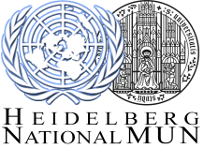7th Heidelberg National MUN Conference 2017

The 7th Heidelberg National MUN conference
will take place in Heidelberg from
Saturday to Sunday, January 7-8, 2017,
at the Neue Universität building in the heart of Heidelberg's beautiful old town.
will take place in Heidelberg from
Saturday to Sunday, January 7-8, 2017,
at the Neue Universität building in the heart of Heidelberg's beautiful old town.
What an amazing weekend it was!
Thanks to the special Hausmeister, the understanding
and later positively active delegates, the chairs,
the returning alumnus from Cyprus, the pagers,
the soup man and his family, the observant faculties,
and the two staff guys!
(Expect participation certificates via mail -
wepe you all got home safely!)
Thanks to the special Hausmeister, the understanding
and later positively active delegates, the chairs,
the returning alumnus from Cyprus, the pagers,
the soup man and his family, the observant faculties,
and the two staff guys!
(Expect participation certificates via mail -
wepe you all got home safely!)
Inspired by recent events starting with the Brexit, the conference will focus on separatism. It features three committees:
A) General Assembly:
Safeguarding the right to self-determination in the 21st century
(as double delegate committee)
(as double delegate committee)
The General Assembly will be discussing separatism in its most overall and fundamental facets. Recognizing various case studies like Scotland, South Sudan, or Tibet, separatism movements differ essentially in their origin, process and result. To find general guidelines for how to deal internationally with those movements will be the aim of this committee. The challenge will be to find an all-embracing pathway between self-determination of people and the sovereignty of nations.
The GA committee will be in session in Heidelberg's spacious Neue Aula, ensuring enough space for work and debate. It will be designed as double-delegate-committee.
Chairs: Katharina Wahedi, Jeremy Schmidt
B) European Council:
Negotiating the framework for the exit of the United Kingdom
(as single delegate committee)
(as single delegate committee)
The people of the United Kingdom have spoken. In the historic referendum held on 23rd June 2016, 52% of the United Kingdom's people have voiced their will to leave the European Union. Hence, for the first time in history a member state is going to leave. In order to implement its people's will the United Kingdom will invoke Article 50 of the Lisbon Treaty, setting into motion a series of negotiations. The negotiations will determine the terms and conditions of the United Kingdom's exit and its future relationship with the European Union.
So what does this entail? First, delegates will have to consider the impact the exit has on the European Union's citizens' rights regarding the United Kingdom. This covers their fundamental rights as stipulated by the European Charter of Fundamental Rights as well as their economic freedoms set forth in the Lisbon Treaty. Second, delegates will need to solve question pertaining to the United Kingdom's and the European Union's economic relationship. In particular, with respect to competition law and customs regulation. And lastly, the United Kingdom's and European Union's foreign relations. This entails various important policy decisions relating to environmental protection, energy policy as well as security and defense.
But above all: There is no precedent guiding the negotiations. It is up to the delegates to negotiate an amicable framework, aligning their countries' and the European Union's best interests.
Chairs: Juliana Tran, Lucas Marlow
C) World Bank:
Financing development
(as single delegate committee)
(as single delegate committee)
- Where does aid conditionality end and national sovereignty begin?
- What can and should be done about aid fungibility?
- To what extent should the World Bank be held accountable for the activities of financial intermediaries?
It will be up to the delegates to ensure projects funded by the World Bank hold up to global scrutiny while nonetheless respecting national interests.
The debate will be slightly different from the normal MUN mode, as the topics will be discussed subsequently rather than parallel. The final votes will be tallied according to the weighted World Bank System. Since the Board of Governors will be reduced in size, the weights will be adjusted accordingly.
- What can and should be done about aid fungibility?
- To what extent should the World Bank be held accountable for the activities of financial intermediaries?
It will be up to the delegates to ensure projects funded by the World Bank hold up to global scrutiny while nonetheless respecting national interests.
The debate will be slightly different from the normal MUN mode, as the topics will be discussed subsequently rather than parallel. The final votes will be tallied according to the weighted World Bank System. Since the Board of Governors will be reduced in size, the weights will be adjusted accordingly.
Chairs: Laura Obenauer, Leonhard Küntzle
Conference logistics:
Heidelberg National MUN 2017 will open its registration desk on Saturday, January 7th, 2017, at 9 a.m. The conference will close on Sunday, January 8th, 2017, at 5 p.m.
The delegate fee is EUR 15,00. Included are conference registration and materials, two lunch meals, and coffee.
Check back here for further updates! If you are into Facebook, take a look at our event page there: www.facebook.com
Shoot us an email if you want to be informed about major developments: hnmun@worldmun-hd.de
